The migrant-hunting business begins at Delaney Hall, the first detention center of the Trump era
Border czar Tom Homan says at least 100,000 beds are needed to fulfill the president’s dream of mass deportations. The first facility will open in New Jersey despite protests
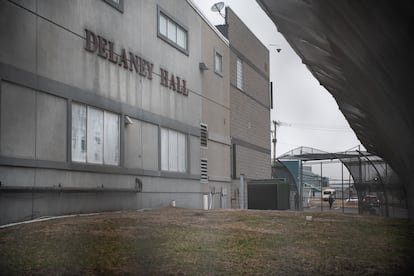

On Doremus Avenue, the world is filled with metal, so industrial and rusty it’s frightening. Above the road stretches the gray sky of Newark, in Essex County, New Jersey, crisscrossed every few minutes by planes arriving in Newark Liberty International Airport, the only spot in the state known to tourists, who pack their bags and land independently in Manhattan. This scene makes sense in the geographical calculations of politicians and investors: with the first immigration detention center of the Trump era set to open on Doremus Avenue in a few months, the airport to transport future deportees is less than two miles away — just a 15-minute bus ride, a walk, a hop away.
This was explained by Caleb Vitello, acting director of U.S. Immigration and Customs Enforcement (ICE), who stated in late February that the Delaney Hall location not only “streamlines logistics” but also “helps facilitate the timely processing of individuals in our custody as we pursue President Trump’s mandate to arrest, detain and remove illegal aliens from our communities.”
Just after noon, people can be seen on Doremus Avenue, proof that there is human life among so much iron and asphalt. An elderly man sweeping the area around a factory offers a friendly greeting. A strong, nauseating smell comes from the Passaic Valley Sewerage Authority plant, across the avenue. The rate of emergency room visits for asthma in Newark is three times higher than the rest of New Jersey, and environmentalists have repeatedly urged authorities to address the poor air quality. The man knows much about the area, but little about Delaney Hall, the compact, opaque building rising to his right, where a petrifying silence reigns. He says that the place has been closed for years but will soon reopen.
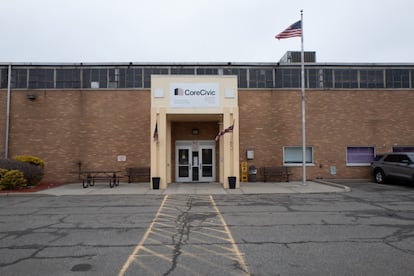
“They say it’s a prison. That’s what they say,” he adds.
From the outside, the building is lined with large wire structures, which look like immense chicken cages. On the roof, almost imperceptible, two men — likely from somewhere in Latin America — are welding. They shout across the distance that the facility will open by the end of May. Greek-born businessman George Zoley, CEO of the GEO Group, the company behind the detention center, has claimed that Delaney Hall is “brand-new inside and it’s all ready to go.”
Although it’s fiercely quiet, cars are constantly entering and leaving the site — but they don’t stay there for long. The security guard, who politely declines to comment, opens the door for them. They are carrying out drug and alcohol screenings, criminal background checks, and interviews with potential employees for the region’s largest immigration detention center, located in a big migrant neighborhood. The facility will house more than 1,000 beds for ICE detainees. It previously housed inmates from 2011 to 2017 before ceasing operations.
Now, the GEO Group — which has fought hard to reopen Delaney Hall against the opposition of New Jersey politicians who’ve pushed for a law banning public and private companies from contracting with ICE — stands to rake in millions. After signing a contract with the federal agency, the company will earn $60 million annually for the next 15 years, potentially nearing $1 billion by the end of the agreement.
Several organizations have criticized that the company is lining its pockets by profiting from each migrant sent to a detention center. For each bed allocated for a migrant, these companies earn an average of $164.65 per day. Congress, for its part, allocates $3.4 billion to arrest an average of 41,500 undocumented immigrants per day. Many agree it’s a profitable business.
“Corporate executives and private prison companies see mass deportations and detention as a payday. And it’s our taxes that will foot the bill,” says Diego Bartesaghi, communications director for Make the Road New Jersey, an immigrant advocacy group advocating for the closure of Delaney Hall and the passage of the Immigrant Trust Act, which prohibits schools, health centers, or shelters from sharing information with ICE. “Private prison companies, like GeoGroup, use detention for profit, not public safety.” According to Bartesaghi, the expansion of detention centers means that “more taxpayer money goes to private prison profits instead of community services” that actually make communities safer.
ICE officials have said that the opening of Delaney Hall will expand the agency’s capacity in the Northeast “to manage the region’s growing enforcement and removal operations.” It will become the second detention center in New Jersey, joining the 300-bed facility in Elizabeth City, managed by the private group CoreCivic.
CoreCivic already has plans to triple the number of beds available for migrants in the coming months, generating an additional $1.5 billion. These companies have found a strong ally in Donald Trump, and their executives say this is perhaps the best opportunity they’ve ever had. “I’ve worked at CoreCivic for 32 years, and this is truly one of the most exciting periods of my career,” said CEO Damon Hininger, according to The New York Times. He also noted that CoreCivic will likely see “the most significant growth in our company’s history.”
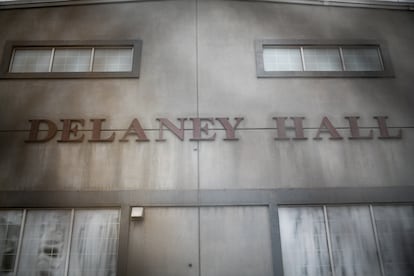
Overcrowding, hunger and forced labor
Near the Elizabeth Detention Center, some men gather around a fire pit. The dirt on their clothes and the soot on their faces indicate they could be mechanics, employees of some maintenance shop. During their lunch break, they relax, listen to music, and slowly roast sausages. They are the only people on Evans Street. It wasn’t like this a few months ago, when entire groups would visit their detained relatives at various times throughout the day.
“There used to be long lines to get in, sometimes you had to pay to get an appointment, but now almost no one comes,” says a Colombian woman who has come to visit her 27-year-old nephew, who is being held at the migrant prison in the city of Elizabeth. “Most of the relatives of the people here are migrants. And obviously, they don’t come anymore because they’re afraid. How could they come?” she wonders.
From the outside, the brick-walled facility, which has been open since 1994 and bears the CoreCivic logo on its front, looks almost empty. However, inside, dozens of detainees spend their days in a facility that has long been the target of complaints about mistreatment, racism, neglect, forced labor, unsanitary conditions, and poor nutrition.
“In Elizabeth, there’s a lack of food and medicine; many migrants and staff members died during the Covid-19 pandemic,” says Rita Dentino, director of Casa Freehold, a local organization serving migrants. “That’s a warehouse; it’s not a place to confine human beings. It has no windows, no fresh air. It’s horrible.”
A Colombian taxi driver who once spent four months at the center agrees. “There’s a lot of racism, there’s little food, they barely let you go out to the patio to get some sun,” he says. The woman visiting her nephew adds that the young man describes the conditions as deplorable. “Why do they want to keep a person like this? I understand they’re detained, but they’re not criminals to be fed like that.”
Her nephew, who refuses to sign his self-deportation to Colombia despite repeated pressure from prison officials, says there’s not enough room inside, that the overcrowding is unbearable. But this complaint is not unique to the Elizabeth Detention Center; it is a national issue. In recent weeks, videos have surfaced exposing the limited capacity of these centers to handle the growing number of immigrants sent there by ICE agents. The facilities are operating at 109% capacity.
In a system with around 38,500 available beds, which is designed to house that many detainees, ICE is currently holding approximately 46,000 people, according to its own records. Still, even that seems too few, and Tom Homan, the border czar, has said that at least 100,000 beds are needed to fulfill Donald Trump’s mass deportation plans.
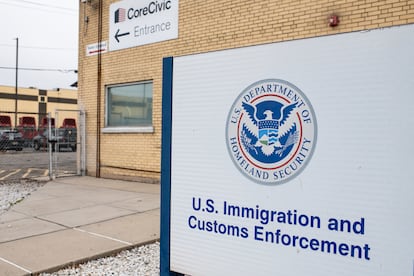
A cause of “terror” for communities
The areas surrounding the Elizabeth Detention Center and Delaney Hall have seen multiple protests in the past month. Dozens of activists and politicians are calling for the permanent closure of the former and to stop the latter from opening. New Jersey officials have also publicly stated that a new migrant detention center is not welcome in the state.
Newark Mayor Ras Baraka called the reopening of Delaney Hall illegal and pledged that his administration would file a lawsuit if it were to open. “If you try to do anything to break the law, we will take you to court,” he promised at one of the demonstrations.
Everyone agrees that with facilities offering greater capacity to house detainees, ICE will increase arrests in the area. Newark has already witnessed more than one raid by federal agents: in late January, they appeared at a local fish market and detained several immigrants without showing a warrant.
“Research shows that when an immigration detention center opens in a community, people in the surrounding area are more likely to be arrested,” says Jenny Garcia, senior communications associate for the Detention Watch Network coalition. According to Garcia, the organizations are not only demanding the closure of these centers but also “that all detainees be released to their families and communities, and not transferred to other facilities across the country.”
It’s also a fact that the increasing raids and arrests are intensifying the fear experienced by migrants in the state. “We are all concerned about the safety of our families and communities,” says Diego Bartesaghi, communications director for Make the Road New Jersey, who believes that the reopening of Delaney Hall “will further fuel terror” in the area. “Since Trump took office, our communities have been living in fear — afraid to go to the grocery store, drop their children off at school, or go to work. The increased presence of ICE and the police will not make us feel safer.”
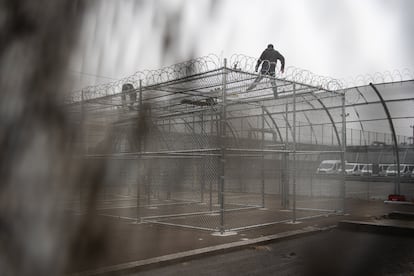
Sign up for our weekly newsletter to get more English-language news coverage from EL PAÍS USA Edition
Tu suscripción se está usando en otro dispositivo
¿Quieres añadir otro usuario a tu suscripción?
Si continúas leyendo en este dispositivo, no se podrá leer en el otro.
FlechaTu suscripción se está usando en otro dispositivo y solo puedes acceder a EL PAÍS desde un dispositivo a la vez.
Si quieres compartir tu cuenta, cambia tu suscripción a la modalidad Premium, así podrás añadir otro usuario. Cada uno accederá con su propia cuenta de email, lo que os permitirá personalizar vuestra experiencia en EL PAÍS.
¿Tienes una suscripción de empresa? Accede aquí para contratar más cuentas.
En el caso de no saber quién está usando tu cuenta, te recomendamos cambiar tu contraseña aquí.
Si decides continuar compartiendo tu cuenta, este mensaje se mostrará en tu dispositivo y en el de la otra persona que está usando tu cuenta de forma indefinida, afectando a tu experiencia de lectura. Puedes consultar aquí los términos y condiciones de la suscripción digital.








































